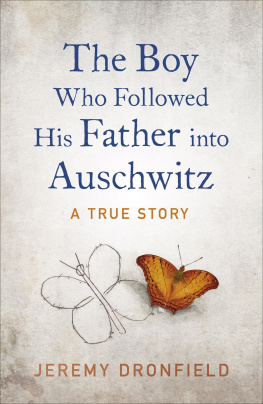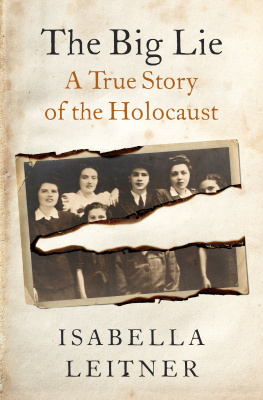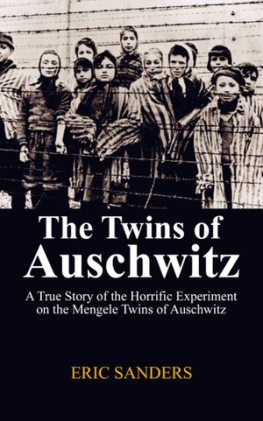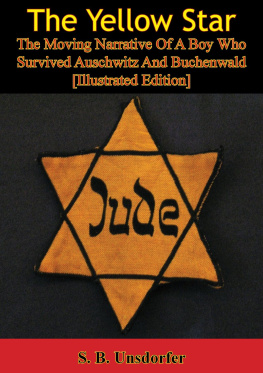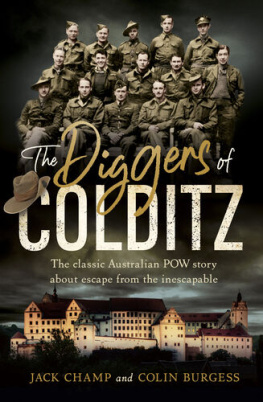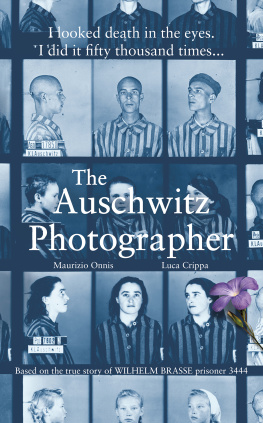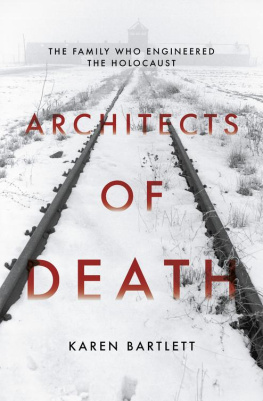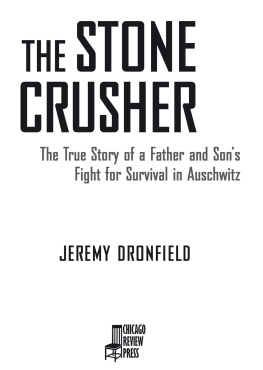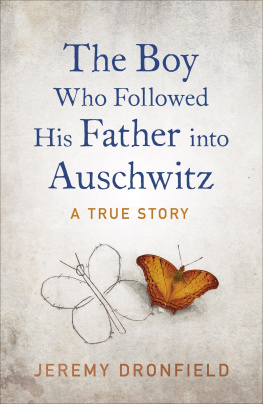Jeremy Dronfield
THE BOY WHO FOLLOWED HIS FATHER INTO AUSCHWITZ

1. When Jewish Blood Drips from the Knife
Now part of southern Poland and western Ukraine.
Sabbath; from just before sundown on Friday to darkness on Saturday evening.
Equivalent to about two or three pounds in 2019.
A cross with T-bars at the ends of the arms.
Ornate cabinet in which the scrolls of the Torah are kept.
Reading table used by a rabbi, facing the ark.
Literally joining; the forcible unification of Austria with Germany.
2. Traitors to the People
Friends close enough to call one another du, the intimate form of you, rather than the formal Sie.
Jew or non-Jew?
Green Henry: equivalent to Black Maria.
Affectionate diminutive used in eastern Austria; e.g. Fritzl, Gustl.
3. Blood and Stone: Konzentrationslager Buchenwald
Seven stone.
5. The Road to Life
SS guard in command of a barrack block.
6. A Favourable Decision
Cabaret emcee.
7. The New World
Conservative Judaism is known outside America as Masorti Judaism.
8. Unworthy of Life
Foreman was a semi-unofficial designation beneath kapo in rank.
Later known as Schuler or Ding-Schuler.
9. A Thousand Kisses
One and a half stone.
Now Terezin, Czech Republic.
Evacuated on 9 June 1942.
Now Zabocie in ywiec, Poland.
Now Vawkavysk, Belarus.
Special labour detail: concentration camp prisoners forced to handle victims before and after executions.
11. A Town Called Owicim
Now Krakw, Poland.
Now Wadowice, Poland.
Now Bielsko-Biaa, Poland.
Later Lww, Poland; now Lviv, Ukraine.
Congratulations/good luck (Hebrew).
12. Auschwitz-Monowitz
Five on the arse! (Polish).
14. Resistance and Collaboration: The Death of Fritz Kleinmann
Military-ration bread made from sourdough with a long shelf life.
17. Resistance and Betrayal
Part of western Poland.
18. Death Train
Now Gliwice, Poland.
Now Beclav, Czech Republic.
21. The Long Way Home
Just over 5 stone.
About 1 stone.
MICHAEL JOSEPH
UK | USA | Canada | Ireland | Australia
India | New Zealand | South Africa
Michael Joseph is part of the Penguin Random House group of companies whose addresses can be found at global.penguinrandomhouse.com
First published 2019
Copyright Jeremy Dronfield, 2019
The moral right of the author has been asserted
Cover images Shutterstock and Getty Images
ISBN: 978-0-241-35918-1
To Kurt
and in memory of
Gustav
Tini
Edith
Herta
Fritz
The witness has forced himself to testify. For the youth of today, for the children who will be born tomorrow. He does not want his past to become their future.
Elie Wiesel, Night
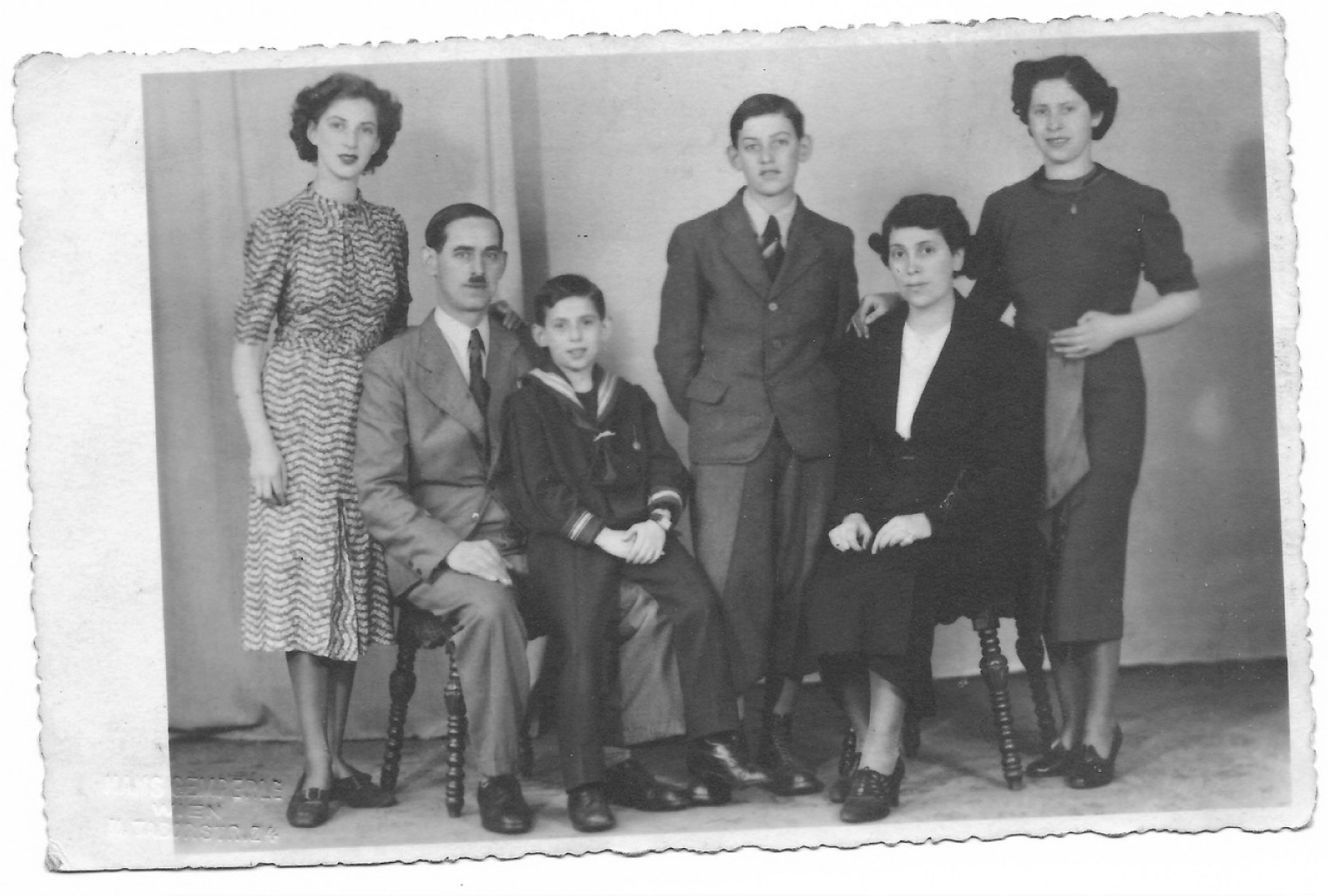
Preface
This is a true story. Every person in it, every event, twist and incredible coincidence, is taken from historical sources. One wishes that it were not true, that it had never occurred, so terrible and painful are some of its events. But it all happened, within the memory of the still living.
There are many Holocaust stories, but not like this one. The tale of Gustav and Fritz Kleinmann, father and son, contains elements of all the others but is quite unlike any of them. Very few Jews experienced the Nazi concentration camps from the first mass arrests in the late 1930s through to the Final Solution and eventual liberation. None, to my knowledge, went through the whole inferno together, father and son, from beginning to end, from living under Nazi occupation, to Buchenwald, to Auschwitz and the prisoner resistance against the SS, to the death marches, and then on to Mauthausen, Mittelbau-Dora, Bergen-Belsen and made it home again alive. Certainly none who left a written record. Luck and courage played a part, but what ultimately kept Gustav and Fritz living was their love and devotion to each other. The boy is my greatest joy, Gustav wrote in his secret diary in Buchenwald. We strengthen each other. We are one, inseparable. This tie had its ultimate test a year later, when Gustav was transported to Auschwitz a near-certain death sentence and Fritz chose to cast aside his own safety in order to accompany him.
I have brought the story to life with all my heart. It reads like a novel. I am a storyteller as much as historian, and yet I havent needed to invent or embellish anything; even the fragments of dialogue are quoted or reconstructed from primary sources. The bedrock is the concentration camp diary written by Gustav Kleinmann between October 1939 and July 1945, supplemented by a memoir and interviews given by Fritz in 1997. None of these sources makes easy reading, either emotionally or literally the diary, written under extreme circumstances, is sketchy, often making cryptic allusions to things beyond the knowledge of the general reader (even Holocaust historians would have to consult their reference works to interpret some passages). Gustavs motive in writing it was not to make a record but to help preserve his own sanity; its references were comprehensible to him at the time. Once unlocked, it provides a rich and harrowing insight into living the Holocaust week by week, month by month, and year after year. Strikingly, it reveals Gustavs unbeatable strength and spirit of optimism: every day I say a prayer to myself, he wrote in the sixth year of his incarceration: Do not despair. Grit your teeth the SS murderers must not beat you.
Interviews with surviving members of the family have provided additional personal detail. The whole from Vienna life in the 1930s to the functioning of the camps and the personalities involved has been backed up by extensive documentary research, including survivor testimony, camp records and other official documents, which have verified the story at every step of the way, even the most extraordinary and incredible.
Jeremy Dronfield, June 2018
Foreword by Kurt Kleinmann
More than seventy years have already passed since the dreadful days described in this book. My familys story of survival, loss of life and rescue encompasses all those connected to that period who experienced incarceration, lost family members, or who were lucky enough to escape the Nazi regime. It is representative of all who suffered through those days and therefore needs to be never forgotten.
My fathers and brothers experiences through six years in five different concentration camps are living testimony to the realities of the Holocaust. Their spirit of survival, the bond between father and son, their courage, as well as their luck, are beyond the comprehension of anyone now living, yet kept them alive throughout the entire ordeal.
My mother sensed the danger we were in as soon as Hitler annexed Austria. She helped and encouraged my eldest sister to escape to England in 1939. I lived under Nazi rule in Vienna for three years until my mother secured my passage to the United States in February 1941. That not only saved my life, but also brought me to the home of a loving family who treated me as if I were their own. My second sister was not so fortunate. Both she and my mother were eventually arrested and deported with thousands of other Jews to a death camp near Minsk. I have known for decades that they were killed there, and have even visited the remote location where it took place, but was deeply moved, devastated in fact, to read in this book for the first time exactly how this event happened.

